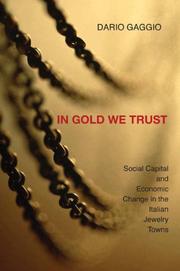| Listing 1 - 5 of 5 |
Sort by
|

ISBN: 9780691126975 0691126976 Year: 2007 Publisher: Princeton Princeton university press
Abstract | Keywords | Export | Availability | Bookmark
 Loading...
Loading...Choose an application
- Reference Manager
- EndNote
- RefWorks (Direct export to RefWorks)
History of Italy --- Applied arts. Arts and crafts --- anno 1900-1999 --- Valenza --- Arezzo --- Vicenza --- SMALL- AND MEDIUM-SIZED FIRMS -- 330.191.4 --- JEWELRY -- 330.191.4 --- Jewelry trade --- Gold industry --- Social capital (Sociology) --- #SBIB:94H5 --- Capital, Social (Sociology) --- Sociology --- Nonferrous metal industries --- Geschiedenis van Italië --- Valenza (Italy) --- Vicenza (Italy) --- Arezzo (Italy) --- Economic conditions. --- Social conditions. --- Vichent︠s︡a (Italy) --- Vicence (Italy) --- Vicetia (Italy) --- Vicentia (Italy) --- Comune di Vicenza (Italy) --- Valenza, Italy --- Valenza Po (Italy) --- Arretium (Italy) --- Aretium (Italy) --- Arecia (Italy) --- Arecium (Italy) --- Arescium (Italy) --- Aretenum (Italy) --- Aretia Civitas (Italy) --- Aretina Civitas (Italy) --- Aretinus (Italy) --- Aretium Fidens (Italy) --- Aretium Talium (Italy) --- Aretium Vetus (Italy) --- Aricia (Italy) --- Aricium (Italy) --- Aritina Civitas (Italy) --- Aritinus (Italy) --- Aritio (Italy) --- Aritium (Italy)
Book
ISBN: 1316792242 1316792722 1316793206 1316795128 1316793680 1316412482 1107127777 1107567211 1316789365 Year: 2017 Publisher: Cambridge : Cambridge University Press,
Abstract | Keywords | Export | Availability | Bookmark
 Loading...
Loading...Choose an application
- Reference Manager
- EndNote
- RefWorks (Direct export to RefWorks)
To its many tourists and visitors, the Tuscan landscape evokes a sense of timelessness and harmony. Yet, the upheavals of the twentieth century profoundly reshaped rural Tuscany. Uncovering the experiences of ordinary people, Professor Gaggio traces the history of Tuscany to show how the region's modern conflicts and aspirations have contributed to forging its modern-day beauty. We learn how the rise of Fascism was particularly violent in rural Tuscany, and how struggles between Communist sharecroppers and their landlords raged long after the end of the dictatorship. The flight from the farms in the 1950s and 1960s disorientated many Tuscans, prompting ambitious development projects, and in more recent decades the emergence of the heritage industry has raised the spectre of commodification. This book tells the story of how many Tuscans themselves have become tourists in their own land - forced to adapt to rapid change and reinvent their landscape in the process.
Rural development --- Land use, Rural --- Cultural landscapes --- Cultural geography --- Landscapes --- Landscape archaeology --- Rural land use --- Land use --- Agriculture --- Community development, Rural --- Development, Rural --- Integrated rural development --- Regional development --- Rehabilitation, Rural --- Rural community development --- Rural economic development --- Agriculture and state --- Community development --- Economic development --- Regional planning --- History. --- Citizen participation --- Social aspects --- Tuscany (Italy) --- Toscana (Italy) --- Regione toscana (Italy) --- Toscane (Italy) --- Region of Tuscany (Italy) --- Tuscany Region (Italy) --- Tuscany (Grand Duchy) --- Civilization. --- History
Book
ISBN: 0691187363 Year: 2018 Publisher: Princeton, NJ : Princeton University Press,
Abstract | Keywords | Export | Availability | Bookmark
 Loading...
Loading...Choose an application
- Reference Manager
- EndNote
- RefWorks (Direct export to RefWorks)
In Gold We Trust is a historical and sociological account of how, by the late 1960s, three small Italian towns had come to lead the world in the production of gold jewelry--even though they had virtually no jewelry industry less than a century before, and even though Italy had western Europe's most restrictive gold laws. It is a distinctive but paradigmatic story of how northern Italy performed its post-World War II economic miracle by creating localized but globally connected informal economies, in which smuggling, tax evasion, and the violation of labor standards coexisted with ongoing deliberation over institutional change and the benefits of political participation. The Italian gold jewelry industry thrived, Dario Gaggio argues, because the citizens of these towns--Valenza Po in Piedmont, Vicenza in the Veneto, and Arezzo in Tuscany--uneasily mixed familial affection, political loyalties, and the instrumental calculation of the market, blurring the distinction between private interests and public good. But through a comparison with the jewelry district of Providence, Rhode Island, Gaggio also shows that these Italian towns weren't unique in the ways they navigated the challenges posed by the embeddedness of economic action in the fabric of social life. By drawing from a variety of disciplinary backgrounds, ranging from economic sociology to political theory, Gaggio recasts the meanings of trust, embeddedness, and social capital, and challenges simple dichotomies between northern and southern Italy.
Social capital (Sociology) --- Gold industry --- Jewelry trade --- Arezzo (Italy) --- Vicenza (Italy) --- Valenza (Italy) --- Social conditions. --- Economic conditions.
Book
ISBN: 9780691187365 Year: 2018 Publisher: Princeton, NJ
Abstract | Keywords | Export | Availability | Bookmark
 Loading...
Loading...Choose an application
- Reference Manager
- EndNote
- RefWorks (Direct export to RefWorks)
Multi
ISBN: 9781316412480 9781107127777 9781107567214 Year: 2017 Publisher: Cambridge Cambridge University Press
Abstract | Keywords | Export | Availability | Bookmark
 Loading...
Loading...Choose an application
- Reference Manager
- EndNote
- RefWorks (Direct export to RefWorks)
| Listing 1 - 5 of 5 |
Sort by
|

 Search
Search Feedback
Feedback About UniCat
About UniCat  Help
Help News
News